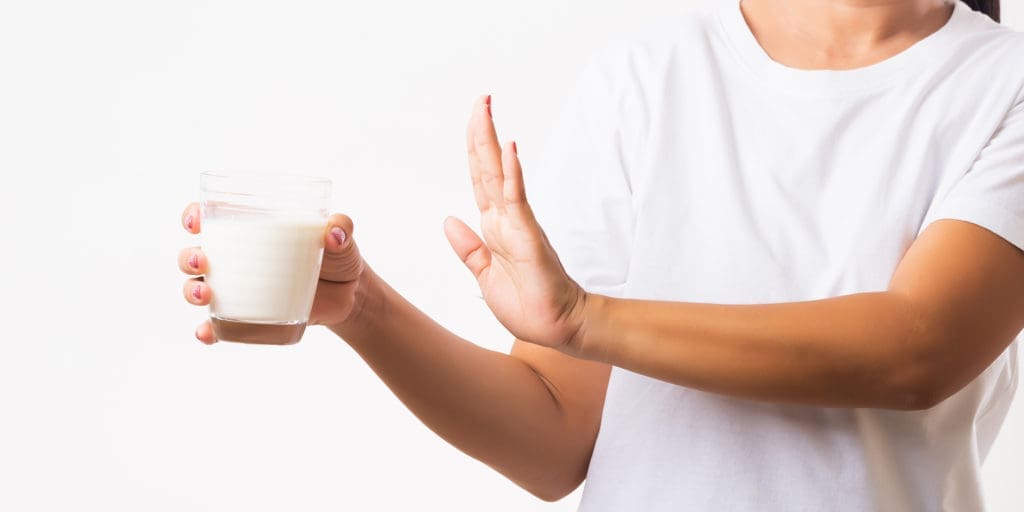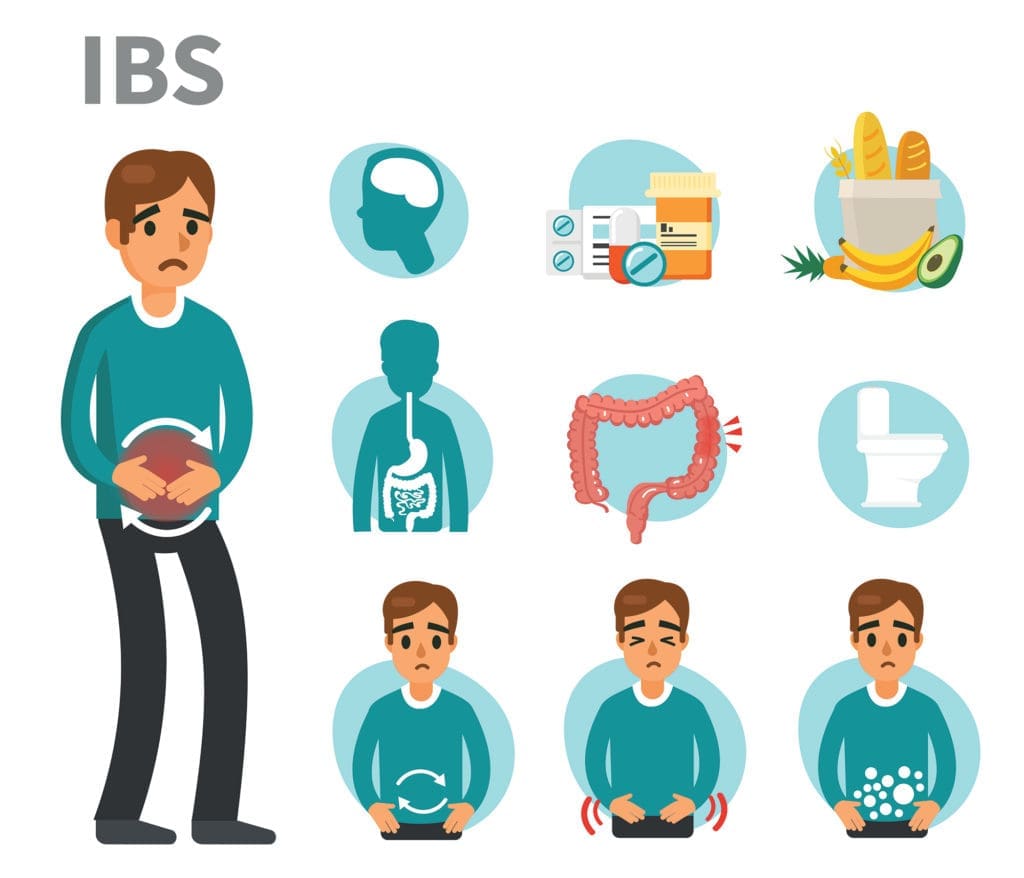While IBS is different for everyone, we’ve created a list of 5 of the most common foods you should avoid when trying to manage your IBS symptoms.
Irritable bowel syndrome (IBS) is a condition that currently has no cure and often results in lifelong management of symptoms. For some, their IBS symptoms can often be alleviated with over-the-counter medications and changes to their lifestyle such as reducing stress and adequate exercise. Perhaps the most common, and in most cases, the most effective, how people with IBS manage their symptoms is through their diet.
A proper diet is important not only for those with IBS but for every individual looking to lead a healthier lifestyle. Symptoms of IBS are different for everyone, ranging from mild bloating and gas to severe cases of abdominal pain, constipation, and diarrhea. Nailing down what you can and cannot eat is tough, and can take a while to figure out. Below is a list of 10 of the most common foods and drinks thought to be associated with IBS triggers.
Fruits
Fructose is a type of sugar found in fruits, vegetables, and honey which, in large amounts, can trigger IBS symptoms in certain individuals. Fructose intolerance can occur in people without IBS, although it is thought to be more prevalent in people with IBS, and is thought to be a possible cause of some of the intestinal symptoms of IBS such as bloating and diarrhea.
Fructose intolerance, also known as fructose malabsorption, occurs when fructose is not completely absorbed into the small intestine. As a result, the fructose reaches the large intestine, where it is digested by large intestine bacteria, which causes fermentation, ultimately leading to the gastrointestinal symptoms associated with IBS such as gas, bloating, diarrhea, and abdominal pain.
Fruits high in fructose can include:
- Apples
- Blackberries
- Mangoes
- Pears
- Watermelon
- Nectarines
- Peaches
- Apricots
What to Eat Instead
Fruits that are relatively low in fructose are generally okay for people with IBS to eat, as they can be more easily absorbed by the small intestine. Fruits that are low in fructose can include some of the following.
- Bananas
- Blueberries
- Cantaloupes
- Kiwi
- Lemon
- Lime
- Oranges
Lactose
 Lactose is found in dairy products such as milk and soft cheeses or creams and can cause problems for many people, not just those with IBS. Individuals that are lactose intolerant have a digestive disorder in which they cannot properly digest lactose. Approximately 65% of people across the globe have some level of lactose intolerance; and while the link between lactose intolerance and IBS is still unclear, many people who suffer from IBS point towards lactose and dairy products as a trigger for their symptoms.
Lactose is found in dairy products such as milk and soft cheeses or creams and can cause problems for many people, not just those with IBS. Individuals that are lactose intolerant have a digestive disorder in which they cannot properly digest lactose. Approximately 65% of people across the globe have some level of lactose intolerance; and while the link between lactose intolerance and IBS is still unclear, many people who suffer from IBS point towards lactose and dairy products as a trigger for their symptoms.
Lactose is the main carbohydrate in most dairy products. While most people can have very low levels of lactose without any symptoms, when you ingest more than your intestines can digest, symptoms such as diarrhea, abdominal pain, and bloating are very common.
Some dairy products to avoid when managing your IBS symptoms can include.
- Cow’s milk
- Sour cream
- Cream cheese
- Ice cream
- Custard
- Ricotta cheese
- Mascarpone
What to Eat Instead
If you believe that dairy products may be a trigger for your IBS symptoms, consider switching to lactose-free milk and dairy replacements such as oat milk or almond milk. Hard cheeses such as feta and brie also have a lower level of lactose and can be a helpful alternative for those looking to satisfy their cheese cravings. If you find that cutting out dairy products completely is needed, and you’re not a fan of dairy replacements, consider eating foods that are higher in calcium to ensure you’re getting your daily recommended levels. Foods such as nuts, seeds, and sardines are high in calcium and have relatively low levels of complications for those with IBS.
Legumes
Legumes are seeds, pods, or other edible parts of a leguminous plant (a part of the pea family), that are often dried and used as a grain. The legume family contains beans, lentils, and peas, and are exceptionally high in fiber and protein, but are also high in compounds called oligosaccharides, a type of carbohydrate that gives this group of foods their famous association with flatulence.
Oligosaccharides are resistant to digestion by intestinal enzymes. This can cause issues such as gas and bloating in just about every individual, but for people with IBS, legumes can cause especially troublesome symptoms. While legumes such as beans can help increase stool size due to their high levels of fiber, which can help with constipation, understanding how they affect your IBS symptoms is important when weighing this benefit.
Legumes that are especially troublesome for people with IBS are:
- Beans
- Lentils
- Peas
- Chickpeas
- Soybeans
What to Eat Instead
Legumes are a difficult category of food to substitute, as they are unique. While not perfect substitutes for legumes, if you are struggling with IBS, you may find that these can help.
- Rice
- Polenta
- Grits
- Quinoa
- Farro
- Tapioca
Vegetables
Certain vegetables can be difficult to digest and can cause IBS symptoms such as gas, bloating, and abnormal bowel habits such as slow bowel movements. Cruciferous vegetables are a relatively diverse group of vegetables containing broccoli, cauliflower, cabbage, and kale to name a few.
For many people with IBS, cruciferous vegetables can cause ‘flare-ups’ in their symptoms, due to their high levels of sulfur. Sulfur can cause several issues for people with IBS, including gas and bloating.
Vegetables that can be especially difficult to digest, and are particularly high in sulfur, can include.
- Broccoli
- Brussels
- Sprouts
- Cabbage
- Cauliflower
- Artichokes
- Coleslaw
- Sauerkraut
What to Eat Instead
If you are struggling with IBS, try to eat vegetables that are both lower in sulfur, and easier for the body to digest. Vegetables that are easy to digest can include some of the following.
- Bean sprouts
- Carrots
- Chives
- Cucumbers
- Eggplant
- Lettuce
- Parsnips
- Potatoes
- Turnips
Sweeteners
Sugar substitutes, such as artificial sweeteners and sugar-free products, can be especially difficult if you suffer from IBS. Sugar-free substitutes and other sweeteners are common in products such as gums, candies, high fructose corn syrup, and honey. Chemicals such as sorbitol and xylitol—both naturally occurring chemical compounds—are two common types of sugar substitutes that have been linked to abdominal pain and diarrhea associated with IBS.
These sweeteners can be troublesome for people who struggle with IBS, as they are difficult to digest. Much like fructose intolerance, sweeteners are commonly not digested in the small intestine, which leads to fermentation in the large intestine causing bloating, gas, and other intestinal symptoms.
Avoid sweeteners such as xylitol, sorbitol, mannitol, isomalt, maltitol, and other sweeteners that end in ‘ol’. These types of sweeteners can often be found in the following foods.
- Sugar-free gums and mints
- Cough medicines and cough drops
- Diet drinks
- Mouthwash
- Sugar-free candies
- Carbonated Beverages
What to Eat Instead
Sugar is perfectly fine to have in moderation, even if you have IBS. The problem with sugar and other sweeteners comes when they are eaten in excess. To avoid symptoms associated with IBS in regards to sweeteners and sugars, try to avoid sweeteners that end with ‘ol’, and aim for more natural sweeteners and honey substitutes. Some alternatives can include the following.
- Maple syrup
- Nurtisweet®
- Splenda®
- Molasses
- Sweeteners that do not end with ‘ol’
Other Foods and Drinks to Avoid


Other foods and beverages are also thought to contribute to symptoms associated with IBS. Other foods and drinks associated with IBS triggers can include some of the following.
- Wheat and rye products such as bread or other baked goods that include wheat flour
- Caffeine, most commonly coffee and teas
- Alcoholic beverages and other carbonated drinks
- Insoluble fibers such as bran, whole grains, corn, and certain vegetable skins
- Chocolate
- Garlic
- Onions
- Processed foods
- Fried foods
Foods to Avoid If You Have IBS Bottom Line
If you are suffering from IBS and find it difficult to manage your symptoms, figuring out what foods may trigger your symptoms could prove to be extremely advantageous. While there are no definitive answers as to what foods cause certain symptoms, there are many foods that have been linked to gastrointestinal complications, which can be extremely difficult for those with IBS.
It’s important to remember that everyone’s IBS is different, and certain foods that bother a specific individual may not be troublesome for others. If your symptoms become worse or do not subside with normal home remedies, it may be time to talk with a doctor about other options for managing your IBS.
What Questions Do You Have About Foods to Avoid If You Have IBS?
Tell us in the comments section below!
What topics should we cover next?
Email us at info@painresource.com with your ideas.
Are you on Facebook?





husband recenty diagnosed with IBS and im researching diets and there is so much confusion.some say eat corn others dont for example. sme with fruits and nuts. so where does one go and what do we follow.
and Coffee. the doc said he could have coffee no worries , but so any sites say no caffeine.
goodness , we could go crazy doing this
I’m experiencing the exact same frustration. My husband was diagnosed and I’m trying to get familiar with his dietary needs. So much contradicting information out there!!!!
husband recenty diagnosed with IBS and im researching diets and there is so much confusion.some say eat corn others dont for example. sme with fruits and nuts. so where does one go and what do we follow.